The Patrick Hamilton Appreciation Society discussion

This topic is about
Stand On Me
Hamilton-esque books, authors..
>
Frank Norman
I've just started reading The Crust on Its Uppers by Derek Raymond, and it's full on Frank Norman, language wise. This surely cannot be coincidence. Or perhaps it is? Either way it's an interesting companion read to 'Stand On Me' and 'Bang To Rights'.
In other Frank Norman news, my copy of 'Banana Boy' arrived today.
In other Frank Norman news, my copy of 'Banana Boy' arrived today.
 I read The Crust On Its Uppers about twenty years ago, and don’t remember very much at all about it. I seem to recall that I liked it enough to scoop up a second book by him, A State Of Denmark, and then stopped there. Usually when I love something, it's a maddening one-way ticket to Completistville, and that never happened with me an’ ol’ Derek, so I’m thinking that I found him to be just okay. Perhaps I’ll dig Crust out and have another go with it again some day sharpish?
I read The Crust On Its Uppers about twenty years ago, and don’t remember very much at all about it. I seem to recall that I liked it enough to scoop up a second book by him, A State Of Denmark, and then stopped there. Usually when I love something, it's a maddening one-way ticket to Completistville, and that never happened with me an’ ol’ Derek, so I’m thinking that I found him to be just okay. Perhaps I’ll dig Crust out and have another go with it again some day sharpish?Meanwhile, I'll say it again... I reckon you're in for a real treat with Banana Boy. I really dug that one a lot and, stylistically, it didn't feel at all like more of the same.
I'm plowing through The Guntz at the moment, and gassing on it bigtime... a hell of a lot of fun in the same way Stand On Me was a lot of fun... only maybe even more so.
Here's the thing with Frank Norman, though.
I’m really baffled by his text being so peppered with Yiddish words... baffled and surprised. I assume [rightly or wrongly] that bits of Yiddish seeped into the London lexicon via the Jewish East End? If that was indeed the case, then I'm also assuming that there's a parallel with America... Yiddish words became common slang in NYC [and very much remain so to this day] because of the old Jewish Lower East Side, but these words never entered the lexicon throughout the entire country. Slip in a bit of Yiddish in, say, Alabama, and they'll look at you like you're from Mars. Would it then be fair to assume it's a similar thing in England... or did certain Yiddish words spread beyond the confines of London and make it to, say, Sunderland, where they're still in regular use?
I'm curious about this. Any thoughts?
Mark wrote: "I’m really baffled by his text being so peppered with Yiddish words... baffled and surprised. I assume [rightly or wrongly] that bits of Yiddish seeped into the London lexicon via the Jewish East End? If that was indeed the case, then I'm also assuming that there's a parallel with America... Yiddish words became common slang in NYC [and very much remain so to this day] because of the old Jewish Lower East Side, but these words never entered the lexicon throughout the entire country. Slip in a bit of Yiddish in, say, Alabama, and they'll look at you like you're from Mars. Would it then be fair to assume it's a similar thing in England... or did certain Yiddish words spread beyond the confines of London and make it to, say, Sunderland, where they're still in regular use?
I'm curious about this. Any thoughts?"
I'm confident this is just a London thing - like your NYC example.
I remember hearing schtum, schlep, schvitz (and doubtless many more I didn't realise were Yiddish) when I was growing up. I doubt they made their way out of London.
Mark wrote: "I read The Crust On Its Uppers about twenty years ago, and don’t remember very much at all about it.
It's not all that to be honest.
It does have a glossary, like Stand On Me, and with many of the same words. Though I cannot imagine anyone ever called people "Ice creams" as Derek Raymond does. Ice cream freezers = geezers. I mean, come on.
There is a lot of charvering going on - a verb I'd never heard before coming across Frank using it (along with charge, another favourite). So who knows? Maybe ice creams was in common parlance.
I'm curious about this. Any thoughts?"
I'm confident this is just a London thing - like your NYC example.
I remember hearing schtum, schlep, schvitz (and doubtless many more I didn't realise were Yiddish) when I was growing up. I doubt they made their way out of London.
Mark wrote: "I read The Crust On Its Uppers about twenty years ago, and don’t remember very much at all about it.
It's not all that to be honest.
It does have a glossary, like Stand On Me, and with many of the same words. Though I cannot imagine anyone ever called people "Ice creams" as Derek Raymond does. Ice cream freezers = geezers. I mean, come on.
There is a lot of charvering going on - a verb I'd never heard before coming across Frank using it (along with charge, another favourite). So who knows? Maybe ice creams was in common parlance.
 Thanks for your take on the Yiddish angle, Nigel, which jives with the assumptions I had made. You, sir, are a diamond mensch.
Thanks for your take on the Yiddish angle, Nigel, which jives with the assumptions I had made. You, sir, are a diamond mensch.I dug out my copy of Raymond’s Crust last night and flipped through it... the passages I skimmed before falling asleep seemed to confirm my original opinion that it was okay, but just merely okay, and probably doesn't merit a revisit in full. While it captures the language in ways similar to the works of Norman, it doesn't come from the same "plain talk" as Norman, which I think is a big part of the appeal [for me, at least] when it comes to Norman's writings. Stand On Me or The Guntz feel quite effortless, while Raymond's writing leaves me feeling like every line was considered, and then reconsidered, which, in the end, makes all the difference in the flow.
"Ice creams"? That's a bit of a stretch!
 Reading his The Monkey Pulled His Hair [1967] at the moment, which was our Frank's first novel. So far, so good. Stylistically more in line with Banana Boy, but I really enjoyed that one a lot, so no grumbling from this quarter.
Reading his The Monkey Pulled His Hair [1967] at the moment, which was our Frank's first novel. So far, so good. Stylistically more in line with Banana Boy, but I really enjoyed that one a lot, so no grumbling from this quarter.Meanwhile, luck was on my side today when I stumbled upon a signed and inscribed first edition hardback copy of Barney Snip - Artist [1968] for a mere twenty bucks. Perhaps not surprisingly, it's from a seller in Los Angeles -- signed and inscribed copies from UK sellers start at more than double.
Thanks Mark - please keep us posted. You're going deep Norman. I will be following but at a more sedate pace. Next up for me is Banana Boy, but there's a fews book ahead of it on the pile
 When it comes to me, self-control ain't a speciality. Although I do plan on halting the Norman purchases after the two additional ones that I want... Bang To Rights and Norman's London. Those, I've been told, are essential.
When it comes to me, self-control ain't a speciality. Although I do plan on halting the Norman purchases after the two additional ones that I want... Bang To Rights and Norman's London. Those, I've been told, are essential.By way of reminding you... chase Banana Boy with Dodgem Greaser, because the former flows directly into the latter.
Mark wrote: "By way of reminding you... chase Banana Boy with Dodgem Greaser, because the former flows directly into the latter. "
Thanks Mark. Will do.
Thanks Mark. Will do.
I'm underway with Banana Boy
The cover of my 1969 Secker & Warburg hardback edition...
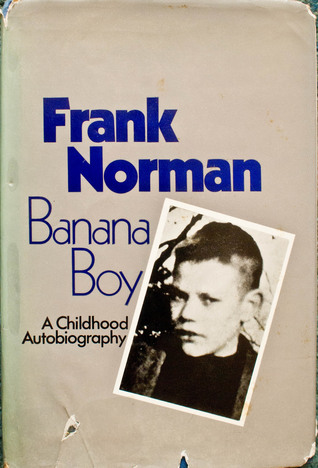
Backcover...
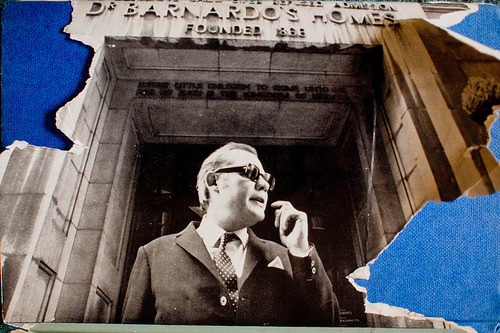
Book description...
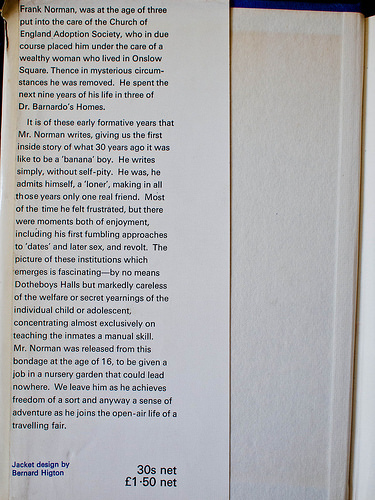
It looks as though my edition was once shelved in a Dr. Barnado's home - the one in Abingdon, Berkshire...
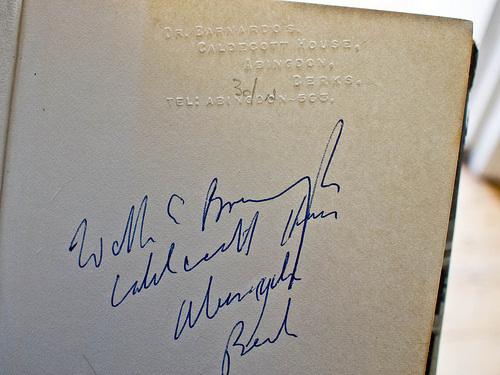
The cover of my 1969 Secker & Warburg hardback edition...

Backcover...

Book description...

It looks as though my edition was once shelved in a Dr. Barnado's home - the one in Abingdon, Berkshire...

Just came across this info about Frank, and am posting it as it is one of the first times I have noticed anyone make reference to his fictional work and specifically "the troika of Soho based detective novels Too many crooks spoil the caper, The Dead Butler Caper and The Baskerville Caper which featured the worn, weary and ever-so-slightly dilapidated and bleary private detective Ed Nelson"...
Frank Norman (1930-1980) was a playwright and novelist whose most well known works are Banana Boy, Bang To Rights (an autobiography of his time in prison), and the troika of Soho based detective novels Too many crooks spoil the caper, The Dead Butler Caper and The Baskerville Caper which featured the worn, weary and ever-so-slightly dilapidated and bleary private detective Ed Nelson. He also wrote the musical Fings Ain’t Wot They Used To Be
Born in Bristol, he was abandoned as a child and spent his formative years being passed from foster home to foster home including Barnados like a human parcel. He ran away to London when he left school and quickly got caught up in a Fagin-like world of shady dealings and crookery for which he spent a short spell in prison. However, he had a talent for writing and within a year of his release, he had published in Encounter magazine a 10,000 word extract from his prison memoir. Championed at first by the editor of the Magazine Stephen Spender, and subsequently by Raymond Chandler who wrote the foreword to Bang to Rights,
https://martinjfrankson.com/2012/07/2...
Frank Norman (1930-1980) was a playwright and novelist whose most well known works are Banana Boy, Bang To Rights (an autobiography of his time in prison), and the troika of Soho based detective novels Too many crooks spoil the caper, The Dead Butler Caper and The Baskerville Caper which featured the worn, weary and ever-so-slightly dilapidated and bleary private detective Ed Nelson. He also wrote the musical Fings Ain’t Wot They Used To Be
Born in Bristol, he was abandoned as a child and spent his formative years being passed from foster home to foster home including Barnados like a human parcel. He ran away to London when he left school and quickly got caught up in a Fagin-like world of shady dealings and crookery for which he spent a short spell in prison. However, he had a talent for writing and within a year of his release, he had published in Encounter magazine a 10,000 word extract from his prison memoir. Championed at first by the editor of the Magazine Stephen Spender, and subsequently by Raymond Chandler who wrote the foreword to Bang to Rights,
https://martinjfrankson.com/2012/07/2...
 Nice edition there, Nigel, and really glad to hear that you managed to start on it... will be looking forward to your thoughts. Like I said, this book was a bit of a departure from him, style-wise, but a welcomed one as it avoided the whole More Of The Same syndrome. Content-wise, I thought it sat alongside his other works very nicely. It's one that I will eventually return to and read again.
Nice edition there, Nigel, and really glad to hear that you managed to start on it... will be looking forward to your thoughts. Like I said, this book was a bit of a departure from him, style-wise, but a welcomed one as it avoided the whole More Of The Same syndrome. Content-wise, I thought it sat alongside his other works very nicely. It's one that I will eventually return to and read again.As for his three Soho detective fictions, from what I gathered via his Wikipedia entry, those three novels represented something of a return to form after "losing it" for a brief period. I've yet to turn up affordable copies of those, though.
Mark wrote: "As for his three Soho detective fictions, from what I gathered via his Wikipedia entry, those three novels represented something of a return to form after "losing it" for a brief period. I've yet to turn up affordable copies of those, though."
I had a search earlier for those detective books and most seemed to start at around £25 which feels v expensive to me.
I wonder why Frank hasn't been reprinted. He seems to have all the qualities to find a niche modern audience.
I had a search earlier for those detective books and most seemed to start at around £25 which feels v expensive to me.
I wonder why Frank hasn't been reprinted. He seems to have all the qualities to find a niche modern audience.
 Not just reprinted, but made the subject of a biography. Now would be the time, while some of his former associates and friends are still alive and lucid.
Not just reprinted, but made the subject of a biography. Now would be the time, while some of his former associates and friends are still alive and lucid.
 Just finished reading The Monkey Pulled His Hair, Norman's first novel. A quick read, and enjoyable overall, but he seemed to be struggling with the form, at least in parts. He seems to be at his finest when writing of his own experiences, taking detours to philosophize and occasionally fictionalize. Still, as another piece to the Frank Norman Puzzle, one could argue that the novel is indispensable. As with his other works, there's no shortage of brilliantly-sketched characters -- colourful denizens of late 1960s Soho, Chelsea and Mayfair. One in particular, Bubbles -- a loud and outrageous ageing Soho lesbian whose penchant for young girls is matched only by her taste in clothing, and is in the habit of addressing everyone as "cuntie" -- fully deserved a novel of her own.
Just finished reading The Monkey Pulled His Hair, Norman's first novel. A quick read, and enjoyable overall, but he seemed to be struggling with the form, at least in parts. He seems to be at his finest when writing of his own experiences, taking detours to philosophize and occasionally fictionalize. Still, as another piece to the Frank Norman Puzzle, one could argue that the novel is indispensable. As with his other works, there's no shortage of brilliantly-sketched characters -- colourful denizens of late 1960s Soho, Chelsea and Mayfair. One in particular, Bubbles -- a loud and outrageous ageing Soho lesbian whose penchant for young girls is matched only by her taste in clothing, and is in the habit of addressing everyone as "cuntie" -- fully deserved a novel of her own. Recommended if found at a reasonable cost, but tamper 75% of your expectations.
Mark wrote: "Just finished reading The Monkey Pulled His Hair, Norman's first novel. "
Thanks for the update Mark - sounds well worth a read.
Yesterday I ordered a copy of 'The Dead Butler Caper' for a penny - with postage the now customary 280 times that valuation. Should arrive in about a week or so.
Mark wrote: "Bubbles -- a loud and outrageous ageing Soho lesbian whose penchant for young girls is matched only by her taste in clothing, and is in the habit of addressing everyone as "cuntie" -- fully deserved a novel of her own"
You'll probably already know that Ian Board, Muriel Belcher's barman at The Colony Club, would greet new arrivals with the self same ‘Hello Cuntie’ welcome. Muriel was also famous for her sweary greetings.
Checkout this great footage of the Colony Room in 1965 with Muriel Belcher holding court and a youthful Ian Board serving drinks behind the bar....
https://www.youtube.com/watch?v=MDpHV...
Thanks for the update Mark - sounds well worth a read.
Yesterday I ordered a copy of 'The Dead Butler Caper' for a penny - with postage the now customary 280 times that valuation. Should arrive in about a week or so.
Mark wrote: "Bubbles -- a loud and outrageous ageing Soho lesbian whose penchant for young girls is matched only by her taste in clothing, and is in the habit of addressing everyone as "cuntie" -- fully deserved a novel of her own"
You'll probably already know that Ian Board, Muriel Belcher's barman at The Colony Club, would greet new arrivals with the self same ‘Hello Cuntie’ welcome. Muriel was also famous for her sweary greetings.
Checkout this great footage of the Colony Room in 1965 with Muriel Belcher holding court and a youthful Ian Board serving drinks behind the bar....
https://www.youtube.com/watch?v=MDpHV...
PS - back to The Monkey Pulled His Hair. I sincerely hope this is the edition you were reading complete with racy period cover....
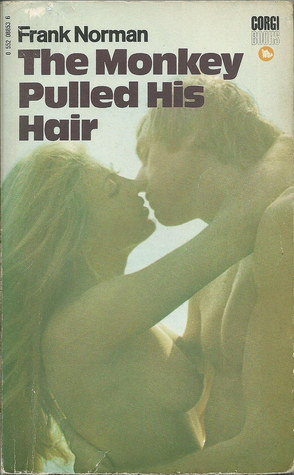

 Nigeyb wrote: "PS - back to The Monkey Pulled His Hair. I sincerely hope this is the edition you were reading complete with racy period cover...."
Nigeyb wrote: "PS - back to The Monkey Pulled His Hair. I sincerely hope this is the edition you were reading complete with racy period cover...."That's the edition I have, which did the job of turning a few heads while reading it on the subway. It actually suited the novel quite well, as the then new sexual permissiveness was on display as much in the text as on the cover.
I'd stumbled across that footage of The Colony Room before. As a brief document, it's wonderful. There's a book out about the history of The Colony Room, but from where I'm sat, there's two insurmountable strikes against it... the staggering price tag, and the ridiculous span of decades covered. Details here...
https://www.amazon.co.uk/Colony-Room-...
 Nice job on finding an affordable copy of The Dead Butler Caper. I'll be very anxious to hear your thoughts, probably followed by being very anxious to nail down a cheap copy for myself!
Nice job on finding an affordable copy of The Dead Butler Caper. I'll be very anxious to hear your thoughts, probably followed by being very anxious to nail down a cheap copy for myself!I turned up fairly reasonably-priced copies of Dodgem Greaser and Norman's London on AbeBooks, via a seller in Australia. Thing is, though, the postage they're demanding is nothing short of extortion. As luck would have it, however, the seller has a brick and mortar shop [selling books, fortunately, and not selling bricks and mortar, of which I have very little use] a mere few blocks away from an old friend of mine in Melbourne, who is coming for a visit next month. Miraculously, she's just made arrangements with them to pick up the books, which she'll tuck into her luggage when she comes to visit.
^ Wow. What a result. That's extraordinary.
Back to The Colony Room I've often wondered about buying that book. There's a used copy on Amazon Uk for just shy of £20 with free postage which is about as cheap as it's likely to ever get.
Hmmmmm
Back to The Colony Room I've often wondered about buying that book. There's a used copy on Amazon Uk for just shy of £20 with free postage which is about as cheap as it's likely to ever get.
Hmmmmm
 Thing is, if it's beautifully printed on a very nice paperstock, in league with a Rizzoli art book, the cost could be justified. But that's impossible to judge by an online listing, isn't it? At £20, though, it very well be worth the gamble.
Thing is, if it's beautifully printed on a very nice paperstock, in league with a Rizzoli art book, the cost could be justified. But that's impossible to judge by an online listing, isn't it? At £20, though, it very well be worth the gamble.I'm guessing you've never spied a copy in a shop, and have never been able to thumb through it?
Mark wrote: "I'm guessing you've never spied a copy in a shop, and have never been able to thumb through it? "
Sadly not. The £20 copy is second hand so there will be evidence of some wear and tear. I'll probably leave it until my to read pile reduces. I've got a good 30 or so books waiting for me to get to them.
Sadly not. The £20 copy is second hand so there will be evidence of some wear and tear. I'll probably leave it until my to read pile reduces. I've got a good 30 or so books waiting for me to get to them.
By the by I'm loving 'Banana Boy' (1969)
As usual, Frank writes simply and with great insight, rarely dwelling upon the many deprivations he suffered, though he repeatedly highlights the lack of any kind of love or affection as the root cause of his lack of educational achievement and general surliness and anger.
A fine memoir - and hasn't his grammar and vocabulary improved since 'Bang to Rights' (1958) and 'Stand On Me' (1960)?
As usual, Frank writes simply and with great insight, rarely dwelling upon the many deprivations he suffered, though he repeatedly highlights the lack of any kind of love or affection as the root cause of his lack of educational achievement and general surliness and anger.
A fine memoir - and hasn't his grammar and vocabulary improved since 'Bang to Rights' (1958) and 'Stand On Me' (1960)?
 Nigeyb wrote: "By the by I'm loving 'Banana Boy' (1969) ..."
Nigeyb wrote: "By the by I'm loving 'Banana Boy' (1969) ..."Really pleased to hear that you're enjoying it, though not surprised. The difference in style couldn't be more stark, yet it still has his stamp all over it.
I've finished 'Banana Boy'
A fascinating picture emerges, the Barnado's homes of the 1930s and 1940s characterised by Victorian attitudes to discipline and nurturing. As in 'Bang to Rights' (1958) and 'Stand On Me' (1960), in 'Banana Boy' (1969) Frank writes simply and with great insight, rarely dwelling upon the many deprivations he suffered, though he highlights the lack of any kind of love or affection as the root cause of his lack of educational achievement and general surliness and anger.
Click here to read my full review
5/5
At the end of his tenure Frank Norman leaves the Barnado's homes, aged 16, to work in a nursery garden. He finally achieves freedom of a sort, to go and work for a travelling fair. This episode of Frank Norman's life is detailed in 'Dodgem Greaser' (1971) and I will read that one next with high expectations and great anticipation.

A fascinating picture emerges, the Barnado's homes of the 1930s and 1940s characterised by Victorian attitudes to discipline and nurturing. As in 'Bang to Rights' (1958) and 'Stand On Me' (1960), in 'Banana Boy' (1969) Frank writes simply and with great insight, rarely dwelling upon the many deprivations he suffered, though he highlights the lack of any kind of love or affection as the root cause of his lack of educational achievement and general surliness and anger.
Click here to read my full review
5/5
At the end of his tenure Frank Norman leaves the Barnado's homes, aged 16, to work in a nursery garden. He finally achieves freedom of a sort, to go and work for a travelling fair. This episode of Frank Norman's life is detailed in 'Dodgem Greaser' (1971) and I will read that one next with high expectations and great anticipation.

Underway with 'Dodgem Greaser' (1971)
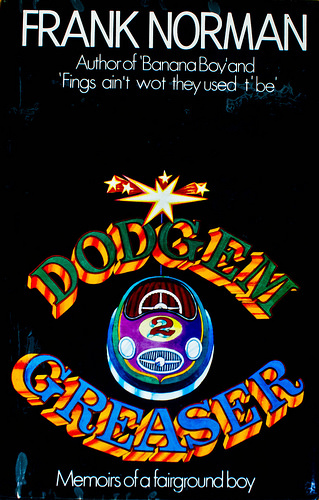
Front cover
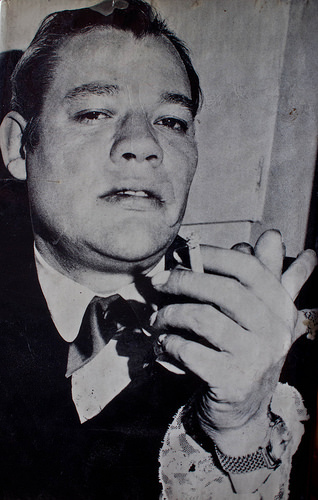
Back cover
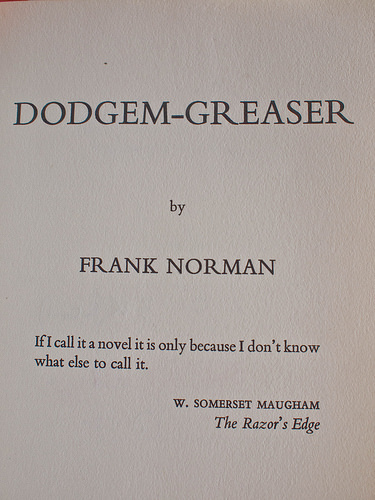
Is it a novel?
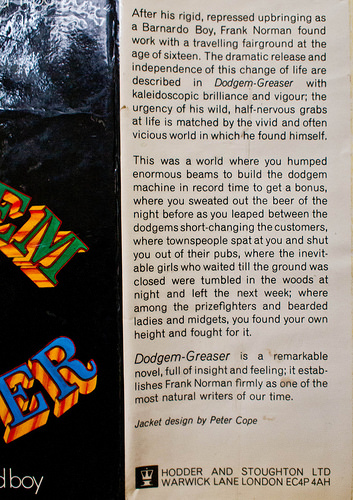
Book blurb. Blurb also refers to it as a novel. Hmmmm.

Front cover

Back cover

Is it a novel?

Book blurb. Blurb also refers to it as a novel. Hmmmm.
 Bravo! Really pleased to hear that you dug it with a king-sized shovel, as did I. Despite generally disliking childhood memoirs, I rate Banana Boy among Norman's finest. I'll cop to being jealous that you're able to immediately chase it with Dodgem Greaser, and I'll be curious to hear whether or not it's on par with its predecessor. Reading them back-to-back seems to be the way nature intended, judging by the final few pages of Banana Boy.
Bravo! Really pleased to hear that you dug it with a king-sized shovel, as did I. Despite generally disliking childhood memoirs, I rate Banana Boy among Norman's finest. I'll cop to being jealous that you're able to immediately chase it with Dodgem Greaser, and I'll be curious to hear whether or not it's on par with its predecessor. Reading them back-to-back seems to be the way nature intended, judging by the final few pages of Banana Boy.I found the passages that detailed his feelings and interactions with Ms Love to be some of the finest in the book, not least of all because they might be the only flash of tenderness or vulnerability he ever displayed.
I agree Mark - a really enjoyable and interesting read.
I've already read 50 pages of 'Dodgem Greaser' (1971), my fourth book by Frank Norman, and I'm thoroughly enjoying it. If anything it's even better than 'Banana Boy' (1969). That's because I find life working on a travelling fairground in 1947 intrinsically more interesting than a life growing up in Barnado's children's homes.
Frank has just lost his virginity, which is strange considering he'd already lost his virginity in 'Banana Boy'. Perhaps that's why Frank describes 'Dodgem Greaser' as a novel? Because he's taken a few liberties with the truth. Either way the scene itself has a huge ring of authenticity. I'll be interested in what you make of it Mark when you get to it.
I've already read 50 pages of 'Dodgem Greaser' (1971), my fourth book by Frank Norman, and I'm thoroughly enjoying it. If anything it's even better than 'Banana Boy' (1969). That's because I find life working on a travelling fairground in 1947 intrinsically more interesting than a life growing up in Barnado's children's homes.
Frank has just lost his virginity, which is strange considering he'd already lost his virginity in 'Banana Boy'. Perhaps that's why Frank describes 'Dodgem Greaser' as a novel? Because he's taken a few liberties with the truth. Either way the scene itself has a huge ring of authenticity. I'll be interested in what you make of it Mark when you get to it.
 Appetite whetted and envy greened.
Appetite whetted and envy greened.To your point, I'm pretty sure that it was that pesky Woodstock Generation who put an end to multiple losses of one's virginity. Blame the hippies.
@ p106/192 of 'Dodgem Greaser'
Superbly readable account of Frank's life on the road. At this stage in his career Frank Norman really was an accomplished writer. It's got the lot - pathos, insights, drama, comedy - and it hangs together really well, in short a page turner.
'Dodgem Greaser' is great follow on from 'Banana Boy' and every bit as good
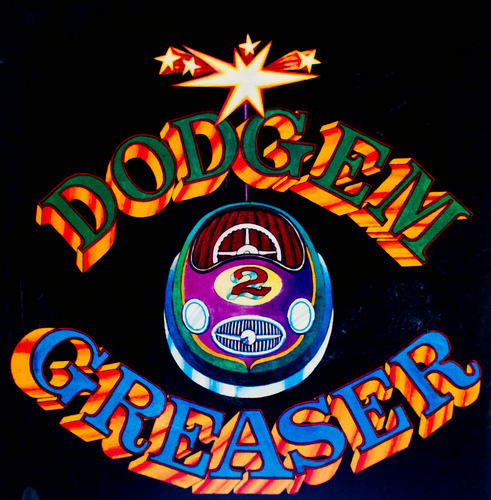
Superbly readable account of Frank's life on the road. At this stage in his career Frank Norman really was an accomplished writer. It's got the lot - pathos, insights, drama, comedy - and it hangs together really well, in short a page turner.
'Dodgem Greaser' is great follow on from 'Banana Boy' and every bit as good

My review of 'Dodgem Greaser' which I have just finished......
Frank Norman (9 June 1930 – 23 December 1980) was a British novelist and playwright. His reputation rests on his first memoir 'Bang to Rights' (1958) and his musical play 'Fings Ain't Wot They Used T’Be' (1960). At the time of writing (2017) all his books are out of print however most are readily available second hand, although some (those I’ve yet to buy) are annoyingly expensive. My hope is that, in time, I will read his entire output as I’ve been very impressed by what I’ve read so far.
'Dodgem Greaser' (1971) is the fourth book I’ve read by Frank Norman and is another memoir, and it immediately follows on from 'Banana Boy' (1969), Frank’s account of growing up as an orphan in Dr. Barnados children's homes during the 1930s and 1940s. At the end of 'Banana Boy’ Frank realises, as a 16 year old out in the world for the first time, that a typical 9-5 lifestyle is not for him so he gets a job working on the dodgems for a travelling fairground. This job, as a Dodgem Greaser, whilst underpaid and generally undertaken by criminals on the run, gives Frank the freedom, independence and life lessons that were denied him by his rigid, repressed upbringing as a Barnado Boy.
Having read his two memoirs from the late 1950s and early 1960s ('Bang to Rights' (1958) and 'Stand On Me' (1960)) I am amazed and impressed by just how much Frank’s writing progressed in the intervening decade. He was barely literate when he wrote 'Bang to Rights’, which was published complete with all his spelling mistakes, however 'Dodgem Greaser' is a superbly readable account of Frank's life on the road, and is testimony to what an accomplished writer he'd become.
The fair moved every week or two to a new location, so Frank and his team, led by the memorable Blackie, and their boss Mr Burns, was an uncompromising world of hard graft and hard living. Humping enormous beams to build and take down the the dodgem track, drinking the wages in the nearest pub, leaping between the dodgems to collect money from the customers, encountering habitual hostility from the local townspeople who were rightly wary of the ‘didicois’, and pulling the local girls drawn to the thrill of the fairground and the dodgem greasers, it was a life rich in incident.
During the summer months the fair was also home to freak shows, boxing, fortune telling, etc. and an associated group of Romani gypsies who travelled with the fair and who Frank is fascinated by and manages to befriend.
Interestingly Frank describes this book as a novel and I suspect he’s taken a few liberties with the truth. Not least losing his virginity which he'd already accomplished in 'Banana Boy'. My guess is that he has incorporated stories that he’d heard from other people in this book. Although he narrates the story in the first person, he is never referred to as Frank, or named, except as “kid”, which also suggests this is, at least in part, not wholly his story. Whatever the provenance of the tales they do all have the ring of authenticity and I came away feeling I’d gained another fascinating insight into a lost world. In addition to these insights readers will encounter fights, sex, hardship, drama, comedy, kindness, tragedy, Satanists (!) and some memorable characters. 'Dodgem Greaser’ is a page turner, and another winner from Frank Norman whose books are ripe for rediscovery.
And, as a concluding aside, the title “Dodgem Greaser” must surely be the greatest Glam Rock band or song that never was.
5/5
Click here to give my review a like
Frank Norman (9 June 1930 – 23 December 1980) was a British novelist and playwright. His reputation rests on his first memoir 'Bang to Rights' (1958) and his musical play 'Fings Ain't Wot They Used T’Be' (1960). At the time of writing (2017) all his books are out of print however most are readily available second hand, although some (those I’ve yet to buy) are annoyingly expensive. My hope is that, in time, I will read his entire output as I’ve been very impressed by what I’ve read so far.
'Dodgem Greaser' (1971) is the fourth book I’ve read by Frank Norman and is another memoir, and it immediately follows on from 'Banana Boy' (1969), Frank’s account of growing up as an orphan in Dr. Barnados children's homes during the 1930s and 1940s. At the end of 'Banana Boy’ Frank realises, as a 16 year old out in the world for the first time, that a typical 9-5 lifestyle is not for him so he gets a job working on the dodgems for a travelling fairground. This job, as a Dodgem Greaser, whilst underpaid and generally undertaken by criminals on the run, gives Frank the freedom, independence and life lessons that were denied him by his rigid, repressed upbringing as a Barnado Boy.
Having read his two memoirs from the late 1950s and early 1960s ('Bang to Rights' (1958) and 'Stand On Me' (1960)) I am amazed and impressed by just how much Frank’s writing progressed in the intervening decade. He was barely literate when he wrote 'Bang to Rights’, which was published complete with all his spelling mistakes, however 'Dodgem Greaser' is a superbly readable account of Frank's life on the road, and is testimony to what an accomplished writer he'd become.
The fair moved every week or two to a new location, so Frank and his team, led by the memorable Blackie, and their boss Mr Burns, was an uncompromising world of hard graft and hard living. Humping enormous beams to build and take down the the dodgem track, drinking the wages in the nearest pub, leaping between the dodgems to collect money from the customers, encountering habitual hostility from the local townspeople who were rightly wary of the ‘didicois’, and pulling the local girls drawn to the thrill of the fairground and the dodgem greasers, it was a life rich in incident.
During the summer months the fair was also home to freak shows, boxing, fortune telling, etc. and an associated group of Romani gypsies who travelled with the fair and who Frank is fascinated by and manages to befriend.
Interestingly Frank describes this book as a novel and I suspect he’s taken a few liberties with the truth. Not least losing his virginity which he'd already accomplished in 'Banana Boy'. My guess is that he has incorporated stories that he’d heard from other people in this book. Although he narrates the story in the first person, he is never referred to as Frank, or named, except as “kid”, which also suggests this is, at least in part, not wholly his story. Whatever the provenance of the tales they do all have the ring of authenticity and I came away feeling I’d gained another fascinating insight into a lost world. In addition to these insights readers will encounter fights, sex, hardship, drama, comedy, kindness, tragedy, Satanists (!) and some memorable characters. 'Dodgem Greaser’ is a page turner, and another winner from Frank Norman whose books are ripe for rediscovery.
And, as a concluding aside, the title “Dodgem Greaser” must surely be the greatest Glam Rock band or song that never was.
5/5
Click here to give my review a like
 I'm about 100 pages into Norman's second novel, Barney Snip - Artist [1968].
I'm about 100 pages into Norman's second novel, Barney Snip - Artist [1968]. Whatever slight struggles he may have had with the novel form while writing his first [The Monkey Pulled His Hair, 1967], he sure seems to have righted that ship within the span of a few months, because I'm really digging Barney Snip - Artist and digging it without finding myself making any allowances.
Described by the publisher thusly...
"Barney Snip has been trained as an artist but has degenerated into an illustrator of magazine articles and book jackets. In his spare time he womanises, and it is one of his women who changes his life by asking him to paint her portrait and introducing him to a leading London art dealer who takes him up. It is, however, another of his women who inadvertently makes him famous. She takes him to the club frequented by the Flower Children and his portraits of them are the sensation of his first exhibition. Overnight he is famous, and though his connection with them leads him to a brief spell in prison this only enhances his reputation."
No deep sleuthing needed to work out the semi-autobiographical parallels. Also rife with that golden Norman calling card of heavy drinking binges in Soho.
Recommended if found at a reasonable price.
Thanks Mark - that one is well and truly on my radar now
And, through the wonders of technology, here is Frank's signature in the very edition that Mark is currently reading....
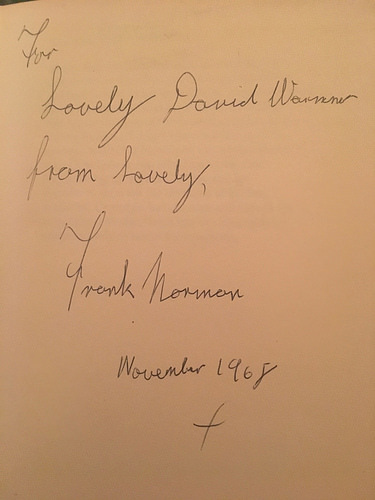
And, through the wonders of technology, here is Frank's signature in the very edition that Mark is currently reading....

 Thanks for posting the image for me, I appreciate it.
Thanks for posting the image for me, I appreciate it.By the look of it, it seems like it could say David Warnner - which is a strange spelling, but then Frank's spelling wasn't necessarily great in the first place. Makes me wonder if this is actually David Warner, who was a hotshot young actor in theatre and films in 60s London, so their paths could well have crossed?
https://en.wikipedia.org/wiki/David_W...
 Just finished our Frank's Bang To Rights and truly dug it to the tune of five stars. I was particularly glad that it didn't leave me with the claustrophobic feeling the prison memoirs almost always tend to do. The spelling and grammar definitely stalled me a few times, but I think publishing it "as is" was the right choice.
Just finished our Frank's Bang To Rights and truly dug it to the tune of five stars. I was particularly glad that it didn't leave me with the claustrophobic feeling the prison memoirs almost always tend to do. The spelling and grammar definitely stalled me a few times, but I think publishing it "as is" was the right choice. On a similar note, I was able to turn up copies of his Too Many Crooks Spoil the Caper [1979] and The Dead Butler Caper [1980] for about a fiver apiece, so each is on its way.
Mark wrote: "Just finished reading The Monkey Pulled His Hair, Norman's first novel. A quick read, and enjoyable overall, but he seemed to be struggling with the form, at least in parts. He seems to be at his finest when writing of his own experiences, taking detours to philosophize and occasionally fictionalize. Still, as another piece to the Frank Norman Puzzle, one could argue that the novel is indispensable. As with his other works, there's no shortage of brilliantly-sketched characters -- colourful denizens of late 1960s Soho, Chelsea and Mayfair. One in particular, Bubbles -- a loud and outrageous ageing Soho lesbian whose penchant for young girls is matched only by her taste in clothing, and is in the habit of addressing everyone as "cuntie" -- fully deserved a novel of her own.
Recommended if found at a reasonable cost, but tamper 75% of your expectations. "
There's a hardback copy for £15 on eBay. Dunno? Seems a lot for one of his lesser works. What do you think Mark? Or indeed anyone else?
Recommended if found at a reasonable cost, but tamper 75% of your expectations. "
There's a hardback copy for £15 on eBay. Dunno? Seems a lot for one of his lesser works. What do you think Mark? Or indeed anyone else?
 I didn't pay anywhere near £15 for my 1967 Corgi paperback edition, so I guess my best advice would be to exercise restraint under the assumption that a cheaper copy will eventually turn up. A quick look turned up cheaper copies on Abe Books, so you might wish to have a butcher's there. Interestingly [or not], there also seems to be offers on AbeBooks for physical copies printed on demand, via a seller in India. Oddly, though, they claim in their listings that the novel had originally been published in 1922, so perhaps they're best approached with caution?
I didn't pay anywhere near £15 for my 1967 Corgi paperback edition, so I guess my best advice would be to exercise restraint under the assumption that a cheaper copy will eventually turn up. A quick look turned up cheaper copies on Abe Books, so you might wish to have a butcher's there. Interestingly [or not], there also seems to be offers on AbeBooks for physical copies printed on demand, via a seller in India. Oddly, though, they claim in their listings that the novel had originally been published in 1922, so perhaps they're best approached with caution?But, yeah, get thee to AbeBooks and do the usual author/title search... you should be able to grab a proper copy for much less than £15.
A good start to the day when this email popped into my inbox....
You won with a £0.99 bid plus £2.90 postage The next step is to pay.
Complete Purchase...
Frank Norman "Too Many Crooks Spoil the Caper” 1st.edn.1979
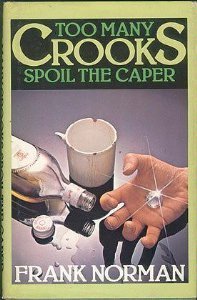
You won with a £0.99 bid plus £2.90 postage The next step is to pay.
Complete Purchase...
Frank Norman "Too Many Crooks Spoil the Caper” 1st.edn.1979

 Nigeyb wrote: "A good start to the day when this email popped into my inbox...."
Nigeyb wrote: "A good start to the day when this email popped into my inbox...."Your day, I'm afraid, can only go downhill. Nice cop, and you couldn't possibly find a cheaper copy. I haven't tucked into my copy yet, but am certainly looking forward to it.
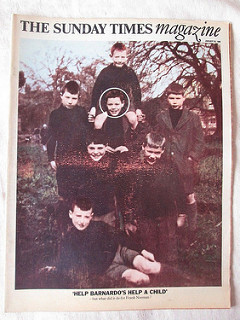
Sunday Times Magazine 26 January 1969
Cover and article: Frank Norman on his time at a Dr Barnardo's Home
Other articles include: Daliah Lavi models a nightdress; children's inventions; The Ford Capri; children photographed impersonating celebrities
What's more you can own this slice of Norman history on eBay - bidding starts at £2.99 + postage....
https://www.ebay.co.uk/itm/3025046122...
Books mentioned in this topic
Stand On Me (other topics)Stand On Me (other topics)
Banana Boy (other topics)
Dodgem Greaser (other topics)
Soho in the Eighties (other topics)
More...
Authors mentioned in this topic
Christopher Howse (other topics)Christopher Howse (other topics)
Jeffrey Bernard (other topics)
Frank Norman (other topics)
Christopher Howse (other topics)
More...





Just began reading The Guntz last night, and it's straight back to cockney slang. So far, so great!